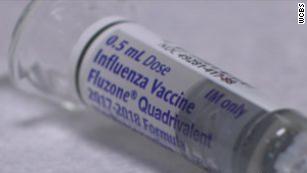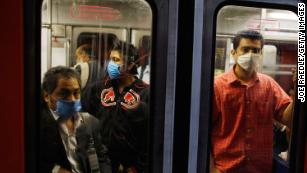Influenza is also way more deadly for Children!!!!
Flu season deaths top 80,000 last year, CDC says
By Susan Scutti, CNN
Updated 1645 GMT (0045 HKT) September 27, 2018
Seasonal flu: What you need to know 01:46
Story highlights
- Flu caused an estimated 80,000 deaths last fall and winter
- The 2017-18 season ranks as the deadliest in more than four decades
- Record 900,000 flu hospitalizations last year
(CNN)An estimated 80,000 Americans died of flu and its complications last winter, according to the US Centers for Disease Control and Prevention. This means it was the deadliest season in more than four decades -- since 1976, the date of the first published paper reporting total seasonal flu deaths, said CDC Spokeswoman Kristen Nordlund.
In previous seasons, flu-related deaths have ranged from a low of about 12,000 during the 2011-2012 season to a high of about 56,000 during the 2012-2013.
Total flu fatalities during the most recent season included the deaths of 180 children, which exceeds the previous record high of 171 during a non-pandemic flu season, according to the CDC.

Flu season is around the corner. Is your family prepared?
"One hundred and eighty kids -- this really hit me hard as the father of three kids -- died last year from the flu. And the majority of them were unvaccinated," said US Surgeon General Dr. Jerome M. Adams. speaking at a
news conference hosted by the National Foundation for Infectious Diseases on Thursday. "Flu vaccinations save lives."
Additionally, the nation experienced a record-breaking estimated 900,000 hospitalizations last flu season.
'Definitely bad'
Overall, the United States experienced one of the most severe flu seasons in recent decades. Severity is based on flu activity, hospitalizations, and deaths from pneumonia or influenza, explained Nordlund. She added, "across the board, last year was definitely bad."
The season began with an increase of illness in November; high activity occurred during January and February, and then illness continued through the end of March.
"The thing that was most notable about last year was how high in terms of activity things were," said Nordlund. She explained that last season, unlike previous seasons, flu did not strike one region of the country and then move across the land. "There were three consecutive weeks when the entire continental US was affected by flu at a very high level," she said.

Flu vaccine, even when just 20% effective, saves tens of thousands of lives
The 2017-2018 season was also marked by
high severity across all age groups -- the first season where the CDC found that to be the case.
Adams said that getting the flu shot by the end of October is not just about keeping yourself safe and healthy, it's also about community. It's your "social responsibility to get vaccinated," he said, since it protects others around you, including family, friends, co-workers and neighbors.
Pregnant women and children
Speaking at the same conference, Dr. Laura E. Riley, professor and chair of the Department of Obstetrics and Gynecology at Weill Cornell Medicine, said that less than half of all pregnant women -- 49% -- received a flu shot last year. She explained that during pregnancy, even a healthy pregnancy, the immune system is not working full throttle.
"Pregnant women who get the flu do very poorly," said Riley. "It is critical that we help pregnant women not get the flu." When flu strikes during pregnancy, there's a greater likelihood of hospitalization for the mother-to-be, she said.
Flu during pregnancy can also harm the baby, she said. High fever for an extended period can cause birth defects and lead to premature birth.
At every trimester, the flu vaccine is safe and effective for both pregnant women and their fetuses, plus it protects babies after they are born, preventing flu in the first six months of their lives when they are too young to get their own flu shot, she said.
Dr. Wendy Sue Swanson, another conference speaker and chief of digital innovation and digital health at Seattle Children's Hospital, stressed that it's very important for children to get vaccinated.
"Kids have a lot of snot, they have a lot of drool and they go to school," she said over laughter from the audience. "We love them, but they are a lot of the reason flu moves around the community."

'Australian flu': It's not from Australia
She said "kids are more likely to be immunized if their parents are" adding everyone 6 months and older should get a flu shot, which is the recommendation of the CDC.
Adams noted that a variety of vaccines have been officially approved this year, including nasal mist, and that they are widely available, including in doctor's offices, local pharmacies, some work places and even certain groceries stores.
Upcoming flu season
Overall, the effectiveness of the seasonal flu vaccine for last season was estimated to be 40%. This means the flu vaccine reduced a person's risk of having to seek medical care by 40%, the CDC found.
Dr. William Schaffner, medical director for the National Foundation for Infectious Diseases, said that those who get flu after receiving vaccine are less likely to require hospitalization and they're less likely to die.
"The vaccine is not perfect," said Schaffner. "But give the vaccine credit for softening the blow."
Looking ahead to the coming winter months, Australia's flu season, which precedes that in the Northern Hemisphere nations, is often an indicator of what's to come in the US, Canada and across Europe. That said, Schaffner warned that flu is "unpredictable."
As of September 9, Australia is experiencing a mild flu season with person-to-person transmission of flu-like illness "increasing slowly" since July, according to that nation's most recent
surveillance report. Deaths attributed to influenza and patients requiring hospitalization have both been low.
Get CNN Health's weekly newsletter
Sign up here to get The Results Are In with Dr. Sanjay Gupta every Tuesday from the CNN Health team.
Adams stressed that flu is "especially deadly for older adults, pregnant women, people with chronic conditions and children" and he recommended everyone take additional steps to avoid the flu this coming season.
Follow daily preventive actions such as washing your hands, covering your cough and staying home if sick. And, he said, get treated quickly and take antiviral drugs if your doctor prescribes them.
Flu "can be serious even for healthy adults and healthy children," said Adams adding, "I'm going to get my flu shot today."



